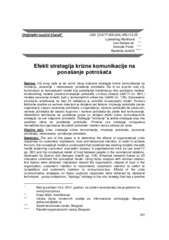Please use this identifier to cite or link to this item:
https://rfos.fon.bg.ac.rs/handle/123456789/781| Title: | Efekti strategija krizne komunikacije na ponašanje potrošača Effects of crisis communication strategies on the behavior of consumers |
Authors: | Ranković, Ljubodrag Stefanović, Ivan Prokić, Sloboda Janičić, Radmila |
Keywords: | strategije krizne komunikacije;poverenje potrošača;nameravano ponašanje potrošača;kriza;impresija potrošača;customer's trust;customer's impression;crisis;crisis communication strategies;behavioral loyalty intentions | Issue Date: | 2011 | Publisher: | Ekonomski institut, Beograd | Abstract: | Cilj ovog rada je da utvrdi uticaj izabrane strategije krizne komunikacije na impresiju, poverenje i nameravano ponašanje potrošača. Da bi se ispunio ovaj cilj, konstruisan je konceptualni model koji predstavlja kombinaciju dva postojeća modela: strukturalnog modela procesa evaluacije potrošača u kriznoj situaciji (vidi/11/ str. 381) i modela poverenja između ljudi u komercijalnim odnosima (vidi/8/ str. 118). Sprovedeno empirijsko istraŽivanje na bazi 23 indikatora je potvrdilo konceptualni model. Pomoću faktorske analize sa varimax rotacijom je dobijeno pet faktora: impresija potrošača prema organizaciji, stepen poverenja potrošača u organizaciju, namera potrošača da preporuči, namera potrošača da nastavi kupovinu i namera potrošača da pređe kod konkurencije. Statističkim tehnikama za poređenje grupa su dobijeni efekti krizno komunikacionih strategija na ove odgovore potrošača. Strategija 'Izvinjenje' je jedina strategija koja ima pozitivan uticaj na ponašanje potrošača. Primena ove strategije omogućava menadžmentu organizacije da zadrŽi potrošače i nastavi razvoj odnosa sa njima. The aim of this paper is to determine the effects of organizational crisis responses on customers' impression, trust and behavioral intention. In order to achieve this aim, the conceptual model is constructed that combines two existing models: the path model explaining customers' evaluation process in organizational crisis by Lee (see/11/ pp. 381) and the conceptual model of trust between people in the commercial relations, developed by Guenzi and Georges (see/8/ pp. 118). Empirical research based on 23 indicators confirmed the conceptual model. Using factor analysis with varimax rotation, five factors were obtained: impression toward the organization, degree of trust in the organization, customer's intention to recommend, customer's intention to switch to competitors and customer's intention to re-buy/cross-buy. Effects of the crisis communication strategies on these customer responses were obtained by statistical techniques group comparison. 'Apology' strategy is the only strategy that has a positive impact on customer behavior. Implementation of this strategy allows the management of the organization to retain customers and to continue developing relations with them. |
URI: | https://rfos.fon.bg.ac.rs/handle/123456789/781 | ISSN: | 0350-0373 |
| Appears in Collections: | Radovi istraživača / Researchers’ publications |
Show full item record
This item is licensed under a Creative Commons License


